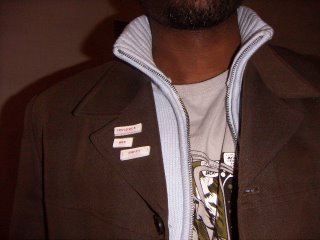Teun Verbruggen has long been a member of many local groups, some of which are among my very favourite: Pascal Schumacher Quartet, Jef Neve Trio, Quatre, Bruno Vansina's VVG Trio (which I've never seen live, but their CD is great), Alexi Tuomarila Quartet, Peter Vermeersch's (from X-Legged Sally) Flat Earth Society and, more recently, Rackham. When I learned that Teun was starting his own group(s), my hopes were immediately very high: from the personnel, it was clear that he was going in a weird-improv-rock direction; from my interactions with him over the years, I was sure it would be anything but run-of-the-mill. Othin Spake's Beurs Café show exceeded my expectations, Nozzle Slag's AB Club appearance was a let-down.
Othin Spake - 27/01/2006, Brussels

Aside from the music, there were also the velcro-able "emotions" that were meant to be exchanged. They were distributed by women in figure-hugging white dresses and World War II-style nurse hats. My choice of "invisible and happy" was a combination of a homage to Ralph Ellison's "Invisible Man," a tribute to the awkwardness of going out alone and a reflection of my general state of mind these past few months (happy, not invisible).
Teun's drums were fully-miked up and reverbed, which worked well in this context. He was totally convincing as a free-improv-prog-rock drummer. The other members of Othin Spake, Jozef Dumoulin on keyboards and Mauro Pawlowski on guitar served as noise-makers, while Teun played everything from rumbling, cymbal-washing prog-rock intros to skin-tight funky grooves. Each set consisted of continuous music, everything flowed really well and naturally, there was no or little sense of anyone "taking a solo" or abruptly forcing the music in a particular direction. And when they hit a groove, they hit it hard and got everyone dancing.
Dumoulin is well-known in jazz (or "jazz") circles here for his exploration of the sound possibilities of the Fender Rhodes. Like Keith Jarrett, it's an instrument he doesn't like, but he's been punishing it for maybe 5-6 years now (maybe more?) and I've heard his ability and creativity grow by leaps and bounds over that time. Actually, listening to the "Cellar Door Sessions," Jozef has a way with the Rhodes that's similar to Jarrett's. He didn't go for either the jazz-derived lines many jazz pianists transfer to the Rhodes (and rarely, if ever, work, IMO) or neo-soul two-chord static layers, but instead created a rich tapestry that has more to do with a rock-studio-production approach. Whereas Jarrett would leaven his abstract playing with funky/bluesy stuff, Jozef does the same with pop/rock-ish melodicism or riffing. I recognised delicate, glowing crescendoes from his "Metropolis" accompaniment. Over time, riffs emerged, a second synth served to play almost-basslines (the almost is crucial, as a usual bassline would have veered the music into normalcy).
Pawlowski plays in the well-known rock band dEus (or however the capitalisation goes). He dove totally into the realm of virtuosic noise, I'm not sure he played a "real note" all night. Tapping and scraping, he added rhythm or sonic disturbance to the mix. It was often difficult/impossible to tell what was coming from Dumoulin and what from Pawlowski. The fourth person onstage was a VJ, projecting images behind the band. He had a few basic sequences (clouds, a frantic race through a maze of skyscrapers...) that he manipulated in response to the music. It worked pretty well.
Nozzle Slag - 01/02/2006, Brussels
Teun's second new group, Nozzle Slag, is a more international affair, as Trevor Dunn and Hilmar Jensson join Teun and Jozef (Jenssen's "Ditty Blei" is a nice album, with Dunn, Jim Black, Andrew d'Angelo and Herb Robertson).
I had a weird feeling about this one and was quite disappointed. IVN disliked it totally. Compared to Othin Spake, the music was much less fun, original and organic. There was a lot of written music, but it felt undigested: the various seams were fairly visible, which really irked me, for some reason. There was much less of a group sound: Jensson would solo in a fairly typical jazz-lines-adapted-to-rock-sounds jazz-rock kind of way, followed by Jozef, oh, now it's Dunn's turn... The music flowed less easily: a glance or nod would signal abrupt changes from a quiet section to a loud one, unlike Othin Spake's way of building and dissipating various moods or grooves. The writing itself didn't appeal to me: again, fairly typical aggressive jazz-rock lines that I don't really like and freer, more open sections that didn't really gel. Even the most let's-rock-out grooves didn't work that well for me.
The one really brilliant moment was when Jozef played alone for a good while. He started with abstract lines and segued into a beautiful ballad-y motif repeated over and over that reminded me of those magnificent chords that open Sigur Rós's "()," but with less pure sounds.
A quick note about the openers, The Love Substites. Pawlowski was in the band, but as drummer. My favourite moment was the encore: Teun drummed wildly, Pawlowski took the mic and repeatedly screeched/shouted something about "We are the Love Substitutes." It was pretty awesome.
